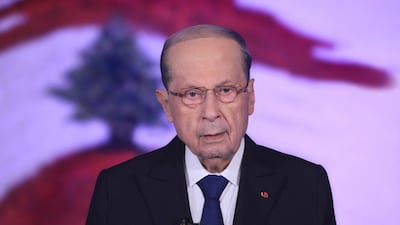Lebanese President Michel Aoun said on Friday the country needs six to seven years to emerge from crisis.
Its economy has been in free fall since 2019, when a mountain of debt and political gridlock drove the nation into its deepest crisis since the 1975-1990 civil war.
"We need six to seven years to get out of this crisis," Mr Aoun said in a televised interview.
Lebanon is grappling with an unprecedented economic crisis, which has been described by the World Bank as one of the worst in modern times.
With more than $98 billion in public debt, Lebanon is one of the world's most indebted nations, forcing it to approach the International Monetary Fund last year for a $10bn bailout package. Although stalled talks with the IMF began after the formation of a new government under Prime Minister Najib Mikati in September, no agreements have been reached.
Lebanon's economy contracted 25 per cent last year and the country's crisis ranks among the world’s top 10 – possibly even the top three – since the mid-19th century, according to the World Bank.
Lebanon needs up to $15bn from its partners to kick-start its economic recovery and shore up fast-diminishing foreign currency reserves, Banque du Liban's governor Riad Salameh said last week.
"Our quota in the IMF is $4bn," he said. "If countries add to it, we could reach $12bn to $15bn, an amount that could help start Lebanon's recovery and restore confidence."
The central bank's mandatory dollar reserves have been slashed by more than half.
"The mandatory reserves are down to $12.5bn," said Mr Salameh, whose finances have come under intense scrutiny since the collapse of Lebanon’s banking sector in 2019, which triggered the crash of the local currency and rapid inflation.
Mandatory reserves stood at $32bn before the start of the economic crisis.
Lebanon had maintained a peg of 1,507.5 pounds to the dollar since 1997. The currency's value against the greenback plunged in 2019 as the government defaulted on about $31bn of Eurobonds, accelerating its economic decline into what the World Bank called last year a "deliberate depression".
The currency has lost more than 90 per cent of its value on the black market, leading to a surge in inflation, a shortage of food and medicine and a rise in unemployment and poverty.
Inflation rose to about 174 per cent in October from the same month a year earlier, according to the country's Central Administration of Statistics. This was the 16th consecutive month of triple-digit inflation.
Lebanese officials have agreed that losses in the country's financial sector amount to between $68bn and $69bn, Reuters reported last week quoting Deputy Prime Minister Saadeh Al Shami.

